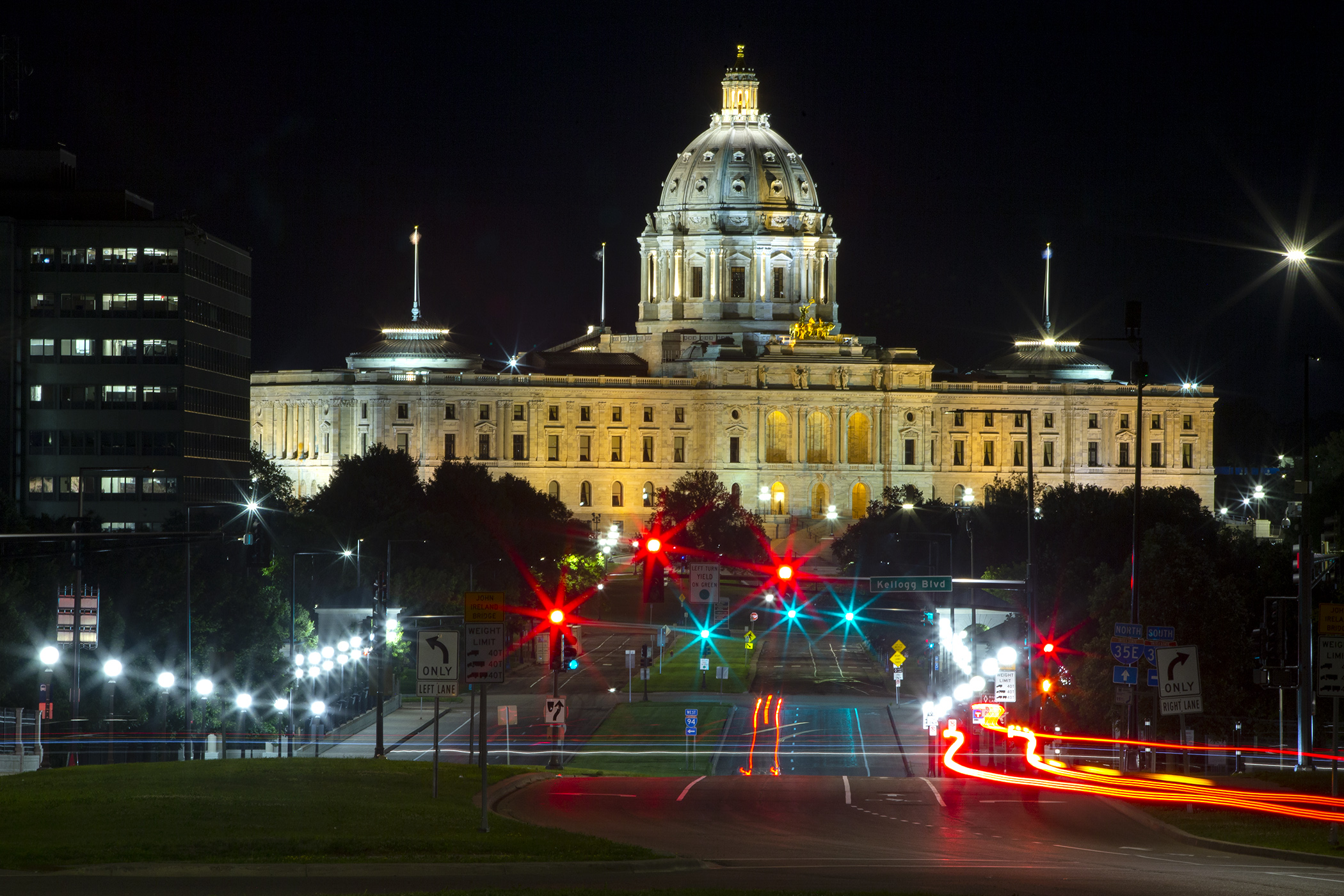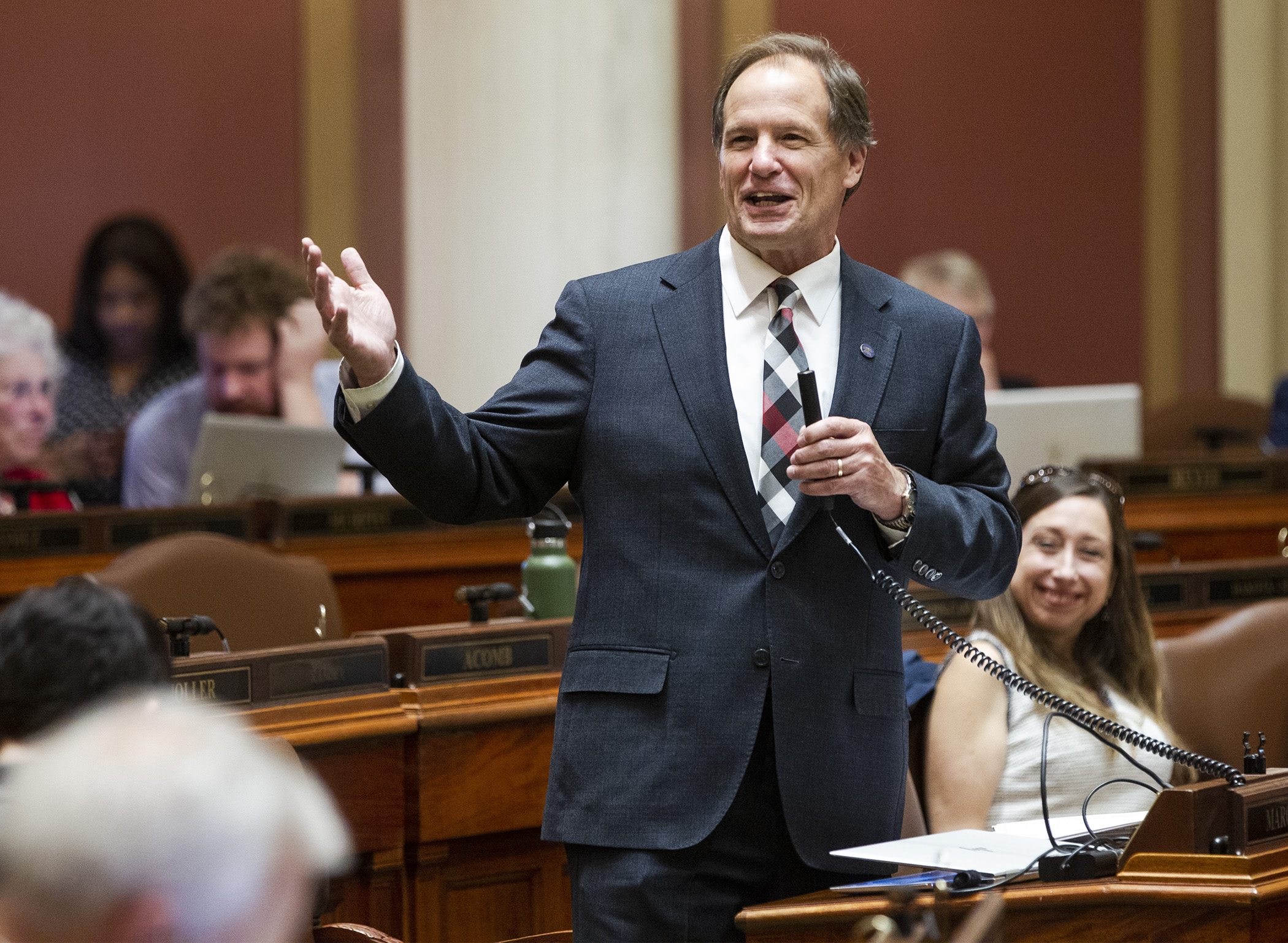House caps off special session by passing omnibus tax bill

Gov. Tim Walz signed all of this year’s omnibus budget bills into law before a new fiscal year began at midnight Wednesday. At that point, the House was still discussing how to pay for them.
Finally, at 1:15 a.m., the House approved the omnibus tax bill, as amended, and sent it to the Senate. Then its special session promptly ended, as the members voted to adjourn sine die and plan to meet up again in January 2022, barring any other special sessions.
By a 69-55 vote, the House passed SSHF9*/SSSF26, a bill sponsored by Rep. Paul Marquart (DFL-Dilworth) and Sen. Carla Nelson (R-Rochester). The bill would produce $49.1 billion in revenue in the 2022-23 biennium that started Thursday and provide $4.2 billion in refunds, aids and credits, including $761 million in new tax cuts and credits.
The biggest portion of that $761 million would come from pulling state tax law into conformity with the federal government on tax exempt status for forgiven Paycheck Protection Program loans and unemployment benefits up to $10,200. The Revenue Department is expected to provide guidance to taxpayers on amending their 2020 tax returns.
The Senate was scheduled to take up the bill shortly before 3 a.m. Thursday. If passed without further amendments, it would then travel to the governor for his signature.
 Rep. Paul Marquart, chair of the House Taxes Committee, makes opening remarks as the House begins debate on the omnibus tax bill June 30. Photo by Paul Battaglia
Rep. Paul Marquart, chair of the House Taxes Committee, makes opening remarks as the House begins debate on the omnibus tax bill June 30. Photo by Paul Battaglia“This isn’t my tax bill, this is Minnesota’s tax bill,” Marquart said. “All of us in this room and in the Senate has had input on this bill. Eighty percent of the bill is COVID-19 recovery and relief, as it should be. That really was the main goal – besides doing a budget – was addressing the hardships that individuals, businesses and families were going through over the last 15, 16 months with COVID-19.
“There is about $644 million of direct tax cuts to people who lost their jobs and businesses who kept on employees during COVID-19. … The unemployment benefits subtraction up to $10,200 per individual would benefit about 500,000 people who lost their jobs, with an average of about a $500 tax cut. … You also have full conformity, every dollar of every loan, on the Paycheck Protection Program. These are businesses that, during this hardship, kept workers on to make sure that we could keep the economy going as best we could.”
Marquart touted the bipartisan nature of the bill, citing provisions from bills sponsored by members from both sides of the aisle. Among those he mentioned were:
- $20 million a year in homeless aid to counties;
- expanding the working family credit to 19- and 20-year-olds;
- a housing tax credit for family and multi-unit developments for low- and middle-income residents;
- increasing the commercial/industrial statewide property tax exclusion from $100,000 to $150,000;
- funding the “angel” investment credit at $5 million for one year;
- extending the historic structure tax credit for one year; and
- a new film production credit of $5 million a year for four years.
[MORE: See more details about the bill and view the spreadsheet]
An amendment was attached to the bill in the House Ways and Means Committee on Saturday that had the potential to complicate debate in the Senate, but was accepted by the Senate Taxes Committee late Tuesday. It added outlays from the General Fund of:
- $29.4 million in one-time grants to counties that must pay a refund to pipeline operator Enbridge as the result of an appeal;
- $6.2 million for planning and development of a freeway cap over Interstate 94 in the Rondo neighborhood of St. Paul; and
- $3 million to the Department of Revenue for administration of the 2021 tax bill.
Also new to the bill since it left the conference committee are some changes in policy that came via the amendment approved in the House Ways and Means Committee. The bill now contains provisions that would:
- establish a working group to make recommendations to the Legislature on the disbursement of $250 million in financial support to frontline workers;
- create a targeted community capital project grant program administered by the Department of Employment and Economic Development;
- provide a sales tax exemption for construction materials used or consumed in the construction of local public safety facilities;
- provide a sales tax exemption for the extra price to sit in a “preferred viewing location” for season tickets to a college sporting event; and
- remove language that broadens the base of the tobacco products wholesale tax.
As Wednesday became Thursday, one particularly controversial amendment was added that would, retroactive to Tuesday, authorize the commissioners of health or human services to declare public health disasters and lay out parameters for that scenario. SomeRepublicans characterized it as returning the governor’s emergency powers to him a night after removing them. The amendment was adopted, as was another that would prohibit lobbying activities by sitting members of the Legislature.
Four other amendments were approved on the House Floor that would:
- appropriate $24 million to the targeted community capital project grant program;
- authorize $6 million in grants for meat processing businesses in redevelopment areas in South St. Paul;
- make the sales tax exemption for construction materials retroactive for some public safety projects;
- extend Ramsey’s tax increment financing district;
- provide appropriations for tourism in Grand Portage; and
- authorize the Seaway Port Authority of Duluth to form a nonprofit corporation.
Among the proposed amendments that weren’t adopted, an anti-Hollywood tone emerged. Despite legislators’ multiple references to the Minnesota-shot “Grumpy Old Men,” the film production credit was a favorite target, as several amendments would have eliminated or reduced the credit to shift more aid to restaurants, retailers and the homeless, and increase the K-12 education tax credit and the Social Security subtraction.
Another unsuccessful amendment would have shifted funding for the Rondo land bridge to local government aid appropriations.
“This is a boondoggle of unimagined magnitude,” said Rep. Jerry Hertaus (R-Greenfield), speaking of the land bridge proposal.
While the legislation contains many tax cuts and credits, the state’s budget reserve is projected to grow to $2.4 billion under the bill.
Related Articles
Search Session Daily
Advanced Search OptionsPriority Dailies
Speaker Emerita Melissa Hortman, husband killed in attack
By HPIS Staff House Speaker Emerita Melissa Hortman (DFL-Brooklyn Park) and her husband, Mark, were fatally shot in their home early Saturday morning.
Gov. Tim Walz announced the news dur...
House Speaker Emerita Melissa Hortman (DFL-Brooklyn Park) and her husband, Mark, were fatally shot in their home early Saturday morning.
Gov. Tim Walz announced the news dur...
Lawmakers deliver budget bills to governor's desk in one-day special session
By Mike Cook About that talk of needing all 21 hours left in a legislative day to complete a special session?
House members were more than up to the challenge Monday. Beginning at 10 a.m...
About that talk of needing all 21 hours left in a legislative day to complete a special session?
House members were more than up to the challenge Monday. Beginning at 10 a.m...